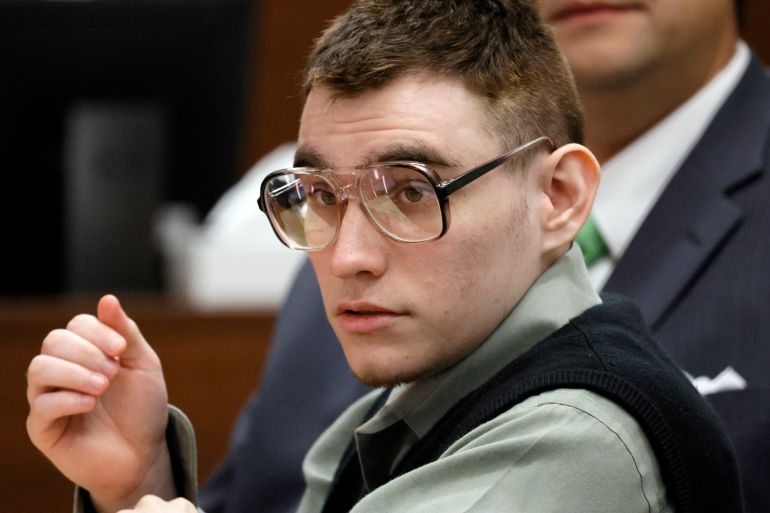Death penalty trial of Parkland high school shooter begins
The months-long US trial will decide whether Nikolas Cruz will be executed or sentenced to life without parole.

Opening arguments have begun in the penalty phase of the trial of Nikolas Cruz, the man who killed 17 people at a Florida high school in 2018 – one of the deadliest school shootings in United States history.
About 50 family members of the victims were in the courtroom on Monday, sitting together in a roped-off section. Some parents wept as prosecutor Mike Satz described in his opening statement how Cruz killed their children. Others sat stoically, their arms crossed over their chests. One woman who lost her daughter fled the courtroom, sobbing and holding tissue to her face.
Keep reading
list of 3 itemsNew video of Uvalde school shooting shows slow police response
Uvalde school shooting report finds ‘systemic’ police failures
Satz called the attack “cold, calculated, manipulative and deadly”, citing the video Cruz made three days before the shooting.
“This is what the defendant said: ‘Hello, my name is Nik. I’m going to be the next school shooter of 2018. My goal is at least 20 people with an AR-15 and some tracer rounds. It’s going to be a big event, and when you see me on the news, you’ll know who I am. You’re all going to die. Ah yeah, I can’t wait,'” Satz said.
During the attack, Cruz stalked through the three-story classroom building for seven minutes, firing his AR-15 semiautomatic rifle down hallways and into classrooms. Some of those killed were shot sitting at their desks, some as they fled, some as they lay wounded on the floor.
Cruz, 23, pleaded guilty in October to the premeditated murder of 14 students and three staff members at Marjory Stoneman Douglas High School in Parkland, about 48km (30 miles) north of the city of Fort Lauderdale on February 14, 2018.

After Satz spoke, Cruz’s lawyers announced that they would not give their opening statement until it is time to present their case weeks from now. That is a rare and risky strategy because it gives Satz the only say before jurors examine grisly evidence and hear testimony from survivors and the victims’ parents and spouses.
When lead defender Melisa McNeill gives her statement, she will likely emphasise that Cruz is a young adult with lifelong emotional and psychological problems who allegedly suffered from fetal alcohol syndrome and abuse.
An expelled student with a history of mental health and behavioural problems at the time of the shooting, Cruz had said in his guilty plea that he was “very sorry” and asked to be given a chance to help others.
The trial comes as gun violence in the US has gotten renewed attention following a spate of recent mass shootings including one at an Independence Day parade outside Chicago, Illinois that killed seven people, and another in May at a school in Uvalde, Texas that left 19 children and two teachers dead.
The Parkland shooting is the deadliest to reach trial in US history. Nine other gunmen who killed at least 17 people died during or immediately after their shootings, either by suicide or police gunfire. The suspect in the 2019 slaying of 23 people at a Walmart in El Paso, Texas is awaiting trial.
US President Joe Biden in June signed the first major federal gun reform legislation in three decades, which he has celebrated as a rare bipartisan agreement.
At a White House event last week to herald the law’s passage, Biden was interrupted by Manuel Oliver, whose son Joaquin was murdered at Marjory Stoneman Douglas.
Oliver shouted “we’ve already gone through this for years and years” and said more needs to be done.
A Parkland victim's father interrupted President Biden's speech on the new gun bill, which does not include an assault weapons ban: "You have to do more than that."
Manuel Oliver's son Joaquin was killed at Parkland.
There have been over 130 school shootings since then. pic.twitter.com/KtU0OECKCj
— AJ+ (@ajplus) July 11, 2022
The trial, which is expected to last about four months, was supposed to begin in 2020, but the COVID-19 pandemic and legal fights delayed it. A jury will now determine whether Cruz should be sentenced to life in prison or receive the death penalty.
When jurors eventually get the case later this year, they will vote 17 times, once for each of the victims, on whether to recommend capital punishment.
Every vote must be unanimous. A non-unanimous vote for any one of the victims means Cruz’s sentence for that person would be life in prison. The jurors are told that to vote for the death penalty, the aggravating circumstances the prosecution has presented for the victim in question must, in their judgement, “outweigh” mitigating factors presented by the defence.
Prosecutors at the Broward County State Attorney’s Office, in arguing for the death penalty, have noted in court documents that the shooting involving an AR-15 rifle was “cold, calculated and premeditated”.
Some teenagers who survived the deadly rampage formed March For Our Lives (MFOL), an organisation calling for gun control legislation such as a ban on assault-style rifles.
Cruz was 18 when he legally purchased the rifle from a licensed gun dealer.